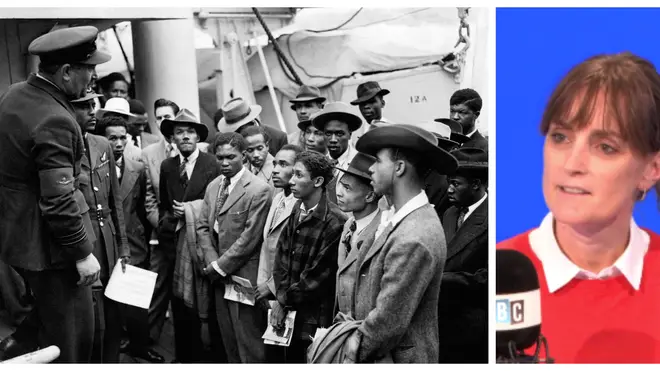
Iain Dale 7pm - 10pm
8 October 2019, 13:16
Amelia Gentleman, The Guardian journalist and author of 'The Windrush Betrayal', talked to James O'Brien about how the Windrush Scandal unravelled and how she first realised it was something more systemic.
Gentleman told James O'Brien: "It began in November 2017, I was contacted by a charity who were very concerned about one of their clients, a woman called Paulette Wilson who had been taken into detention, was being threatened with deportation back to Jamaica. A country that she hadn't been in for 50 years.
"So Paulette is 61, arrived in Britain from Jamaica at the age of 10, and had lived all her life here, had worked in the House of Commons as a chef. There was absolutely no reason to detain her or to deport her because she had been living here entirely legally.
We published that article in The Guardian and, in the weeks that followed, I was gradually contacted by more and more people who were experience peculiar, very harsh decisions at the hands of the Home Office."
James O'Brien asked if she initially thought that Paulette was a one off?
She replied: "Yes. I just thought that it was an inexplicable, very cruel decision by the Home Office that was a mistake. In the weeks that followed, it became obvious that something much more systemic was going on and eventually clear that this was something affecting 1000s of people."
James then asked how he realised it was systemic.
Gentleman replied: "Two things. The coalition government had made this commitment to getting net migration to the tens of thousands. They weren't able to get it down. Quarter after quarter, these migration figures would come out showing they would get nowhere near their target.
So, in about 2012, there was a concerted effort through the cabinet to introduce a whole spectrum of policies that would make Britain a very hostile environment, in Theresa May's words, to anyone who was here illegally and that required people to show their passports on many more occasions, not just at the border, but when they were trying to get housing, when they were trying to get jobs, healthcare."
She explained how part of the problem was that "the Home Office wasn't very good at determining who was here legally and who was here illegally and that's kind of the one thing you would expect the Home Office to be good at".
She continued: "All of the people affected by the scandal were here legally. They arrived in the 60s, 70s, just didn't have the paperwork."
She told James about the upsetting case of man taken to Jamaica to celebrate a 50th birthday party. It was his first time back in Jamaica since childhood. Airport officials, upon his returns, said he didn't have right passport and wasn't allowed back for 18 months.

The scandal, Gentleman said, was evidently not an accident. She explain: "The government certainly had very clear warnings four or five years before the problem emerged that exactly this group of people would be affected and somehow or other these warnings were discarded, it really raises difficult questions about what kind of person the government is concerned about and what kind of person it is prepared to accept may became collateral damage of new policies introduced."
A lot of people, according to Gentleman, have attributed it all to racism - and an independent government enquiry is looking into this.